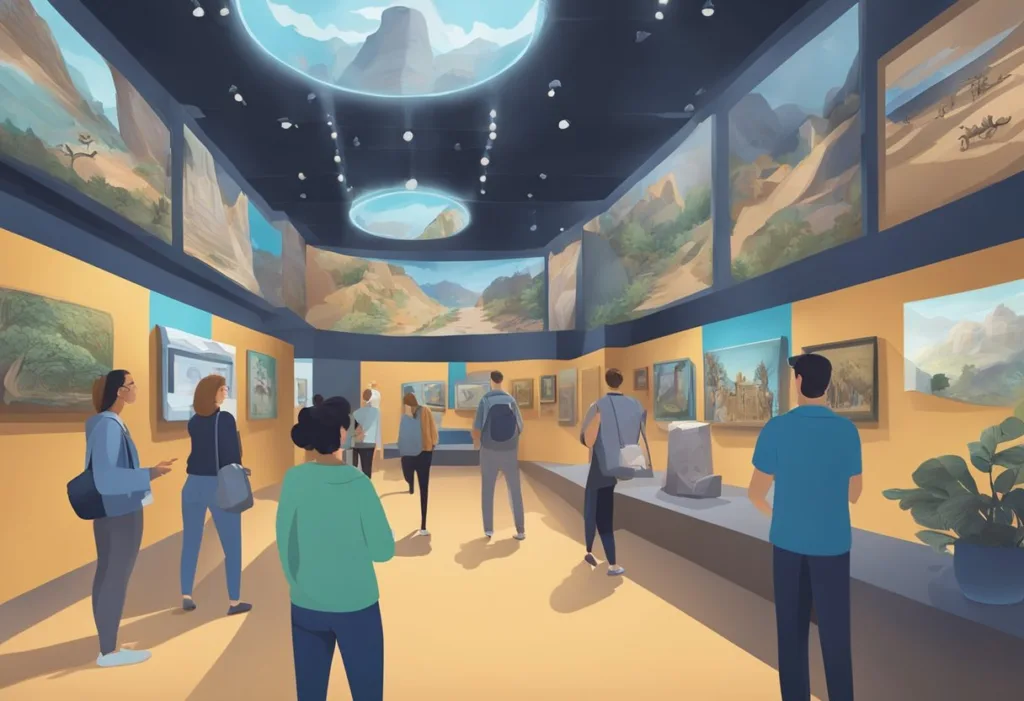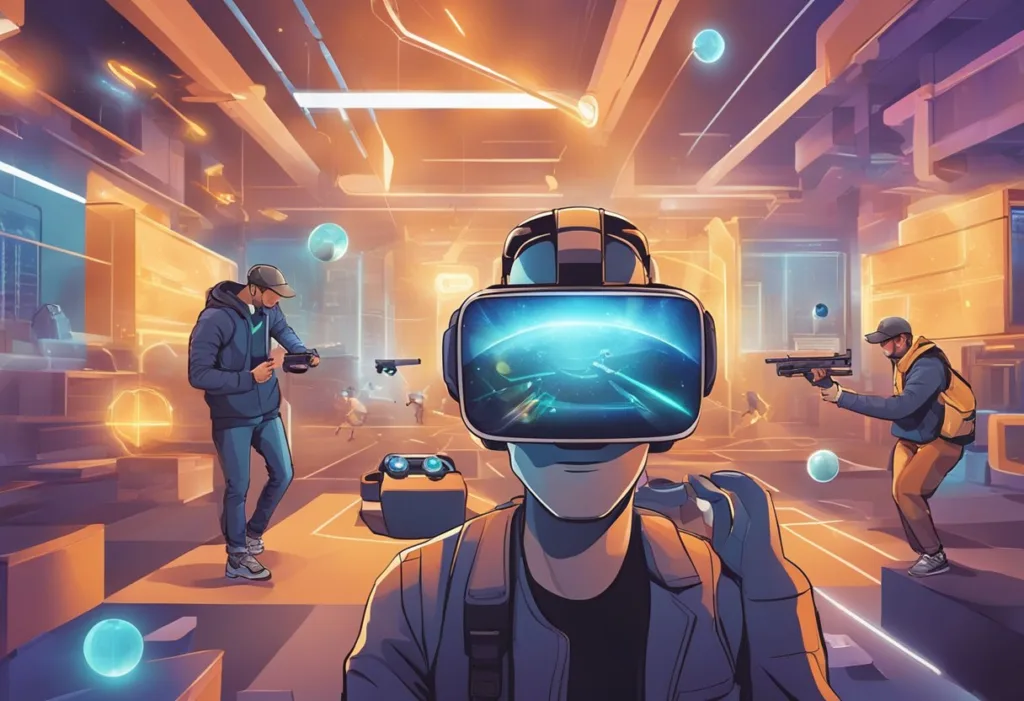Metaverse studios are becoming increasingly popular in the entertainment industry as technology advances. These studios are dedicated to creating immersive experiences within virtual worlds and offer a new way to consume entertainment. One such example is Readyverse Studios, which was recently launched by Ernest Cline, the creator of the popular novel and movie Ready Player One.
Readyverse Studios is a Los Angeles-based firm that aims to bring the open metaverse depicted in Cline’s book and movie into reality. The studio is co-founded by Cline and Dan Farah, who produced the film adaptation of Ready Player One. The firm has about 30 employees and is focused on creating content for the metaverse platform.
The metaverse is a virtual universe where users can interact with each other in real-time, and metaverse studios are dedicated to creating content for this platform. With the rise of virtual reality and other immersive technologies, the metaverse is becoming an increasingly popular platform for entertainment. As more metaverse studios emerge, we can expect to see a wide range of content being created for this platform, from games to movies to social experiences.
The Evolution of Metaverse Studios
Metaverse studios are virtual reality (VR) spaces where users can create, design, and interact with digital environments.
These studios have evolved rapidly over the past few years, transforming the way we interact with technology and media. In this section, we explore the history and evolution of metaverse studios, including their cost, features, and influence on Hollywood and virtual reality.
What are Metaverse Studios?
Metaverse studios are virtual spaces where users can create, design, and interact with digital environments. These studios offer a range of tools and features for users, including 3D modeling, animation, and game development. Users can create their own avatars, explore virtual worlds, and interact with other users in real-time.
Things to do in Metaverse Studios
Metaverse studios offer a wide range of activities and experiences for users. Some of the most popular activities include game development, socializing, and virtual events. Users can also explore virtual worlds, create their own avatars, and participate in immersive experiences like concerts and art exhibitions.
Cost for Using Metaverse Studios
The cost of using metaverse studios varies depending on the platform and features. Some platforms offer free access to basic features, while others require a subscription or payment for advanced features. Users can also purchase virtual goods and currency within the platform to enhance their experience.
From Hollywood to Virtual Reality
Metaverse studios have had a significant impact on Hollywood and the entertainment industry. Many studios and filmmakers are now using virtual reality and metaverse platforms to create immersive experiences for audiences. For example, Steven Spielberg’s adaptation of Ernest Cline’s “Ready Player One” was heavily influenced by the concept of the metaverse.
Influence of Ready Player One
Ready Player One” is a science fiction novel by Ernest Cline that explores a dystopian future where most of humanity spends their time in a virtual reality world called the OASIS. The novel heavily influenced the development of metaverse studios and virtual reality platforms. The novel was later adapted into a film by Steven Spielberg in 2018, further popularizing the concept of the metaverse and its potential impact on society.
Metaverse studios have evolved rapidly over the past few years, transforming the way we interact with technology and media. These virtual reality spaces offer a range of tools and features for users, including game development, socializing, and virtual events.
As Hollywood and the entertainment industry continue to embrace virtual reality and metaverse platforms, the potential for these platforms to shape the future of media and entertainment is significant.
Top 10 metaverse studios
1. Epic Games
Epic Games is the creator of the Unreal Engine, one of the most advanced game engines used to create high-fidelity experiences in the gaming industry and beyond.
They are also known for developing “Fortnite,” which has evolved beyond a battle royale game into a virtual space where concerts and other live events occur, aligning with metaverse concepts.
Epic Games continues to push the boundaries of what is possible with interactive entertainment and digital experiences, making significant strides toward the development of a metaverse.
2. Roblox Corporation
Roblox Corporation oversees the Roblox platform, which allows users to create and play games made by other users. It is a vast ecosystem where millions of players engage in a multitude of experiences, from games to virtual events.
Roblox’s unique model, where creators can monetize their games and experiences, has positioned it as a key player in the emerging metaverse, with the platform continuously expanding its capabilities and user base.
3. Linden Lab
Linden Lab is the developer of Second Life, one of the first platforms to offer a fully realized virtual world where users can socialize, conduct business, and create virtual content. While Second Life has been around since 2003, it remains an example of an early metaverse concept. Linden Lab has continued to support Second Life and explore new technologies that could further enhance virtual worlds.
4. Mojang Studios
Mojang Studios, a subsidiary of Microsoft, created Minecraft, a game that allows players to build and explore in an open-world environment made of blocks. Minecraft supports multiplayer gameplay and has a strong community that creates and shares content. These elements contribute to a metaverse-like experience, and Mojang Studios continues to update the game, adding new features and supporting its vibrant community.
5. Niantic, Inc.
Niantic, Inc. is known for developing augmented reality (AR) games such as Pokémon GO and Ingress. These games merge the digital and physical worlds, allowing users to interact with digital objects placed in real-world locations. Niantic is working on expanding its AR technology to create more immersive experiences and contribute to the development of an AR layer of the metaverse.
6. Valve Corporation
Valve Corporation, the company behind the Steam gaming platform, is also a key player in the VR space. With the release of the Valve Index VR headset and games like Half-Life: Alyx, Valve is contributing to the development of immersive virtual experiences. They continue to develop new technologies and content for VR, which is a critical component of the metaverse.
7. Unity Technologies
Unity Technologies provides the Unity game engine, a popular tool for creating 3D content across various platforms, including VR and AR. Unity’s engine is used by a vast number of developers to create games and experiences that could form parts of the metaverse. Unity Technologies is actively developing new features and capabilities to support the creation of more complex and interconnected virtual spaces.
8. Hello Games
Hello Games developed No Man’s Sky, a game featuring a procedurally generated universe with countless planets to explore. After its initial release, the game has received significant updates that have expanded multiplayer capabilities and added more depth to the universe, aligning with the persistent and evolving nature of the metaverse. Hello Games continues to support No Man’s Sky with updates that enhance the shared experiences of its players.
9. Manticore Games
Manticore Games is the studio behind Core, a platform that provides tools for users to create, share, and play games and experiences. Core’s focus on user-generated content and the creation of a variety of interactive experiences positions it as a burgeoning part of the metaverse ecosystem. Manticore Games is working on expanding Core’s capabilities and fostering a community of creators.
10. The Sandbox
The Sandbox is a blockchain-based virtual world that allows users to create, own, and monetize voxel-based assets and gaming experiences. It leverages non-fungible tokens (NFTs) to provide a decentralized economy where players have true ownership of their creations. The Sandbox is working on expanding its virtual world, offering new tools for creation, and integrating with other blockchain technologies to enhance its metaverse platform.
Technological Foundations of Metaverse Studios
Metaverse studios are built on the foundations of cutting-edge technology. The use of Artificial Intelligence (AI), Augmented Reality (AR), and Virtual Reality (VR) is essential for creating the immersive experience that defines the metaverse.
Artificial Intelligence and Gaming
AI is a critical component of metaverse studios as it enables the creation of intelligent characters and non-player characters (NPCs) that can interact with users in a realistic and engaging way.
AI algorithms can be used to create intelligent agents that can learn from user interactions and adapt to their behavior. AI can be used to create smarter game mechanics, such as dynamic difficulty adjustment, which makes the game more challenging as the user becomes more skilled.
Augmented and Virtual Reality
AR and VR are the key technologies that enable the creation of immersive environments in metaverse studios. AR overlays digital content onto the real world, while VR creates a completely digital environment. AR and VR headsets are used to immerse users in the metaverse, enabling them to interact with the digital world in a more natural and intuitive way. The use of AR and VR in metaverse studios can create a sense of presence, making users feel like they are actually in the metaverse.
Metaverse studios rely heavily on Unity, a cross-platform game engine that is used to create immersive experiences across multiple platforms. Unity enables developers to create high-quality graphics and realistic physics simulations, which are essential for creating immersive environments in the metaverse.
The technological foundations of metaverse studios are built on cutting-edge technology such as AI, AR, and VR. These technologies enable the creation of immersive environments that can be experienced across multiple platforms. By leveraging these technologies, metaverse studios can create engaging and immersive experiences that keep users coming back for more.
Intellectual Property and Brand Expansion
Metaverse studios are rapidly expanding their brand presence and intellectual property in the virtual world. As they continue to create unique and immersive experiences for their users, they must also consider how to protect their intellectual property and expand their brand.
Franchises and Avatar Creation
One way in which metaverse studios can expand their brand is by creating franchises and allowing users to create avatars based on these franchises.
This not only allows for greater brand recognition but also creates a sense of community among users. For example, a metaverse studio could create a franchise based on a popular movie or TV show, such as Warner Bros’ Harry Potter franchise, and allow users to create avatars based on characters from the franchise.
To protect their intellectual property, metaverse studios must ensure that they have proper licensing agreements in place for any franchises they use. They must also ensure that users are not creating avatars that infringe on any existing intellectual property rights.
Collaborations with Entertainment Giants
Another way in which metaverse studios can expand their brand is by collaborating with entertainment giants such as Apple and Hollywood. Such collaborations not only provide valuable exposure for the metaverse studio but also allow for the creation of unique and exciting experiences for users.
However, metaverse studios must be careful when collaborating with entertainment giants to ensure that they are not infringing on any existing intellectual property rights. They must also ensure that they have proper licensing agreements in place for any intellectual property they use.
Metaverse studios must carefully consider how to protect their intellectual property and expand their brand as they continue to create unique and immersive experiences for their users. By creating franchises, allowing users to create avatars, and collaborating with entertainment giants, metaverse studios can expand their brand while also protecting their intellectual property.
Economic Aspects of Metaverse Studios
Metaverse Studios are rapidly becoming a popular medium for creators to showcase their work and engage with their audience in a virtual environment. As the metaverse continues to grow, it is important to understand how these studios generate revenue and create value for their users.
Monetization and Value Generation
Metaverse Studios generate revenue through various channels such as virtual goods, advertising, and event sponsorships. Virtual goods, such as avatar customizations and in-game items, are a popular way for studios to generate revenue. These goods can be purchased using traditional payment methods or cryptocurrencies.
Advertising is also a significant revenue stream for metaverse studios. Brands can advertise their products or services within the virtual environment, providing a unique opportunity to engage with a highly targeted audience. In addition, event sponsorships are another way for metaverse studios to generate revenue. Brands can sponsor virtual events, providing exposure to a large and engaged audience.
Value generation in the metaverse is not limited to revenue streams. Metaverse Studios also create value by providing a platform for creators to showcase their work and engage with their audience. The metaverse allows for a unique and immersive experience, providing a new way for creators to connect with their audience.
Ownership and Transactions in the Metaverse
Ownership and transactions in the metaverse are facilitated through the use of blockchain technology and non-fungible tokens (NFTs). NFTs provide a way for creators to monetize their work, allowing for the creation of unique digital assets that can be bought and sold on the blockchain.
Real estate is another area where ownership and transactions are important in the metaverse. Virtual land can be bought and sold, providing a way for creators to establish a presence in the metaverse. As the metaverse continues to grow, virtual real estate is becoming increasingly valuable.
The economic aspects of metaverse studios are diverse and evolving. Metaverse studios generate revenue through virtual goods, advertising, and event sponsorships, while also creating value by providing a platform for creators to showcase their work.
Ownership and transactions in the metaverse are facilitated through the use of blockchain technology and NFTs, providing a way for creators to monetize their work and establish a presence in the metaverse.
User Engagement and Experience
The success of any metaverse studio depends on user engagement and experience. The ability to provide immersive experiences and interactivity is crucial for creating a virtual world that users want to explore. A well-designed user experience can make the difference between a game that is popular and one that is not.
Immersive Experiences and Interactivity
Metaverse studios must focus on creating immersive experiences that draw users into the virtual world. The ability to interact with virtual objects and characters is a critical component of this experience. Interoperability between different virtual environments is also essential for providing a seamless experience for users.
In the metaverse, providing an immersive experience enables a player to connect and interact with virtual versions of products or services, which can translate into higher conversion rates in the real world. The ability to provide a sense of presence and immersion is critical for any metaverse studio that wants to succeed.
Education and Training in Virtual Environments
The metaverse has the potential to revolutionize education and training. Metaverse studios can create virtual environments that allow users to learn and practice new skills in a safe and controlled environment. This can be particularly useful for training in high-risk industries such as aviation or medicine.
In addition to training, metaverse studios can also create virtual classrooms that allow students to learn in a more engaging and interactive way. The ability to create a sense of presence and immersion can make learning more enjoyable and effective.
Metaverse studios must focus on creating a user experience that is immersive, interactive, and engaging. The ability to provide a seamless experience across different virtual environments is also essential. By focusing on these key areas, metaverse studios can create virtual worlds that users want to explore and engage with.
Frequently Asked Questions
Is Metaverse Studio free?
Yes, Metaverse Studio is free to use. The software can be downloaded from the official website without any cost.
What career opportunities are available at Metaverse Studios?
Metaverse Studios offers a wide range of career opportunities for individuals interested in the field of virtual reality. Some of the available positions include software developers, 3D artists, game designers, and marketing professionals. Interested candidates can visit the company’s careers page to learn more about the available positions.
How can I download the Metaverse Studio app?
The Metaverse Studio app can be downloaded from the official website. Simply visit the website and click on the “Download” button to get started.
Is there a cost associated with using Metaverse Studio or its apps?
No, there is no cost associated with using Metaverse Studio or its apps. The software is completely free to use.
What are the steps to create a virtual space within the Metaverse?
Creating a virtual space within the Metaverse involves several steps. First, users need to create a 3D model of the space they want to create. They can then import this model into Metaverse Studio and use the software to add interactive elements like objects, animations, and sounds. Once the space is complete, users can publish it to the Metaverse and invite others to explore it.
Can Metaverse Studio be used for augmented reality experiences?
Yes, Metaverse Studio can be used to create augmented reality experiences. The software includes tools for creating 3D models, animations, and interactive elements that can be used in AR experiences.
What are the system requirements for running Metaverse Studio software?
Metaverse Studio requires a computer with a 64-bit processor and at least 4GB of RAM. The software is compatible with Windows, macOS, and Linux operating systems. Users will need a graphics card that supports OpenGL 3.3 or higher.














